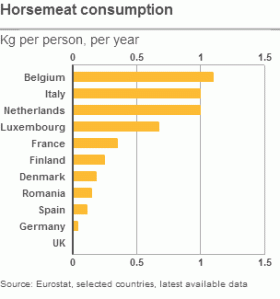Princess Anne this week revived the horse meat scandal with her comments regarding whether horse owners would look after their horses more carefully if they could sell them for human consumption at the end of their lives. The BBC commentary on it was one of the more considered pieces, which didn’t really blow it out of proportion as she does quite clearly state that she wanted the debate to be had not that she was definitely for it. The horse meat scandal earlier on in the year took up a lot of time on BBC Radio 4 on my drive to and from work everyday and I kept hearing arguments for eating horse meat based on the idea that it is a perfectly normal thing on the continent. I go to France at least once a year to stay with friends who have their own horses and it seems vaguely disloyal to contemplate eating one when there were four visible from the dining room and kitchen. Especially when I’ve gone out and fed them the dry ends of the baguettes which they are so keen on…
I’ve seen plenty of horse meat in the supermarket, so I had unquestioningly accepted this assumption about the frequency of horse meat consumption. However, when seeing this graph on horse meat consumption, unexplained, in the article link above, there appears to be very little evidence to support any assertion that horse meat is a common behaviour.
 Image source: http://www.bbc.co.uk/news/uk-24952823
Image source: http://www.bbc.co.uk/news/uk-24952823
Do you see the problem with this graph?
What this graph shows is that people in Belgium on average have approx 1.1kg per year of horse meat. Given an average portion size of 150-200g, this is about 6-7 portions per year, or once every two months. Belgians eat approx 30.4kg of meat in total per year, so 1.1kg being horse meat is a small proportion – certainly not making them prolific horse-meat eaters, or even prolific meat-eaters! When teaching statistics to my students I always teach them that one number on its own is not helpful – generally you need several in order to get a proper picture of whatever activity is being investigated. Further you need to convert the units into actual real-life units in order to give a even clearer picture. What 30.4kg breaks down to is 202 days out of 365 days getting a single 150g portion of meat in that day, which is just over half the year. Obviously there is a slight fallacy here as there will be a number of people not eating meat at all (vegetarians!) who will be bringing down the average for the whole country, and of course these numbers don’t give us the range or standard deviation in order to see if there are some avid meat consumers eating, say 400g per day, but still…
I think we need a campaign to teach people better statistics. I’m not convinced that the people who are arguing for the consumption of horse meat as it is a common behaviour have actually looked at these stats – and if they have, they certainly haven’t been able to translate them into human behaviours. Either way, I’m still not convinced that eating horse meat is necessarily a good thing – why don’t people focus on the benefits of horse meat over other types instead of going for the “other people do it so we should too” type of argument, which I think I’ve demonstrated is not as strong an argument as they might assume.
